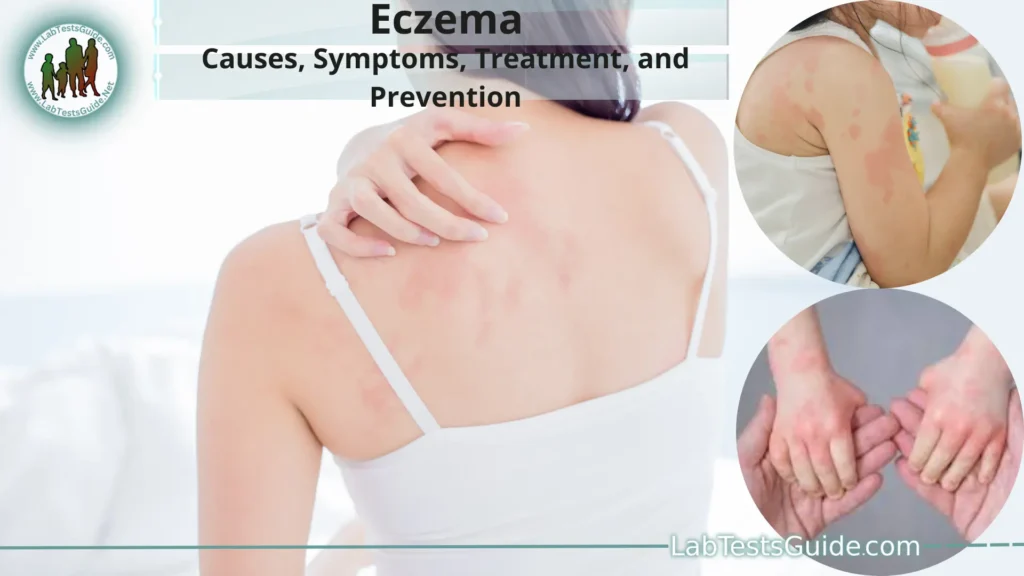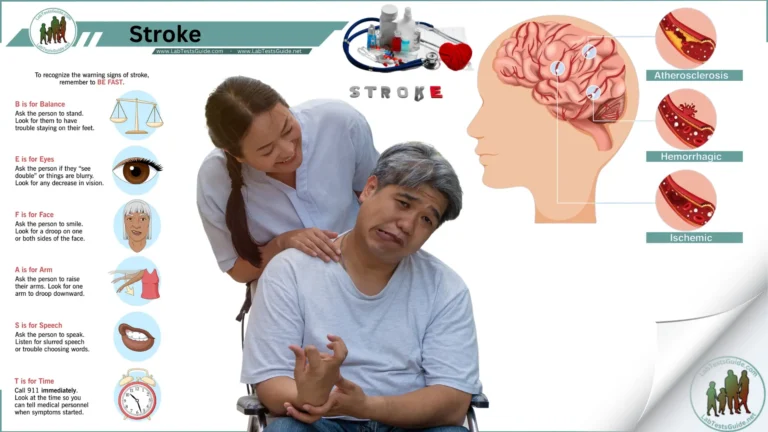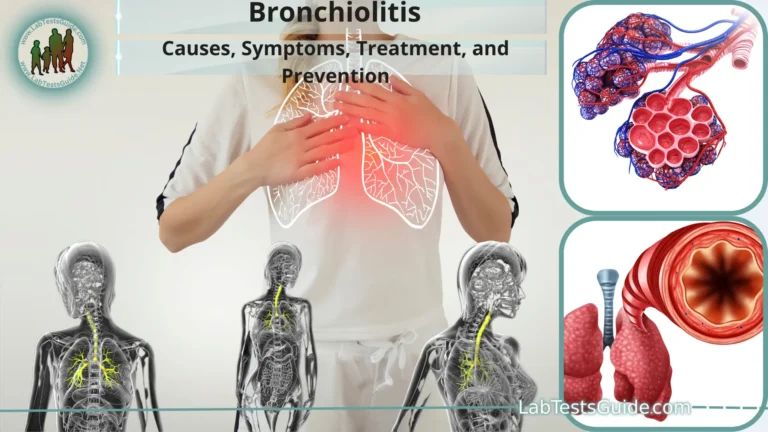Eczema, also known as atopic dermatitis, is a chronic skin condition characterized by inflammation, itching, and red, dry, and scaly patches on the skin. It is a common skin condition that affects people of all ages but is particularly prevalent in infants and young children.

What is Eczema?
Eczema, also known as atopic dermatitis, is a chronic skin condition characterized by inflammation, itching, and red, dry, and scaly patches on the skin. It is a common skin disorder that affects people of all ages, but it is especially prevalent in infants and young children.
The exact cause of eczema is not fully understood, but it is believed to result from a combination of genetic and environmental factors. People with a family history of eczema, asthma, or hay fever are more likely to develop the condition. Additionally, certain environmental triggers, such as irritants, allergens, dry air, and stress, can exacerbate eczema symptoms.
Causes and Triggers:
Here are some key causes and triggers of eczema.
- Genetic Predisposition: Family history plays a significant role in the development of eczema. If one or both parents have a history of eczema, asthma, or hay fever, the risk of a child developing eczema increases.
- Abnormal Skin Barrier: People with eczema tend to have a compromised skin barrier. The skin’s outermost layer (stratum corneum) is responsible for retaining moisture and protecting against irritants and allergens. In eczema, this barrier is often defective, leading to increased water loss and susceptibility to irritants.
- Immunological Factors: Eczema is associated with an overactive immune response in the skin. Certain immune cells release inflammatory substances, such as cytokines, leading to skin inflammation and itching.
Environmental Triggers:
Various environmental factors can exacerbate eczema symptoms. Common triggers include.
- Irritants: Substances like soaps, detergents, harsh chemicals, and fragrances can irritate the skin and worsen eczema.
- Allergens: Pollen, pet dander, dust mites, mold, and certain foods can trigger allergic reactions, leading to eczema flare-ups.
- Extreme Temperatures: Cold, dry air in winter or hot and humid conditions in summer can affect the skin and trigger eczema.
- Sweating: Excessive sweating can irritate the skin and trigger eczema, especially in skin folds.
- Fabrics: Certain fabrics, like wool and synthetic materials, can cause skin irritation and worsen eczema.
- Microbes: Bacterial and viral infections, like Staphylococcus aureus or the herpes simplex virus, can exacerbate eczema symptoms.
- Stress: Emotional stress and anxiety can lead to a worsening of eczema symptoms. Stress may not cause eczema directly, but it can trigger or aggravate flare-ups in people who already have the condition.
- Diet: While not a direct cause of eczema, some individuals may experience flare-ups after consuming certain foods, especially those they are allergic to. Common trigger foods include dairy, eggs, nuts, soy, wheat, and seafood.
Symptoms and Diagnosis:
The symptoms of eczema can vary in intensity and appearance but generally include.
- Itching (Pruritus): Intense itching is the most common and persistent symptom of eczema. The affected skin may be intensely itchy, leading to a strong urge to scratch.
- Red and Inflamed Skin: Eczema patches typically appear red and inflamed due to increased blood flow and inflammation in the affected areas.
- Dryness and Scaling: The skin affected by eczema often becomes dry, scaly, and rough to the touch.
- Thickened Skin: In some cases, repeated scratching can cause the skin to thicken and become leathery.
- Cracked or Oozing Skin: If the eczema is severe or infected, the affected skin may develop cracks, blisters, or small open sores that ooze fluid.
- Bleeding: Scratching can cause the skin to break, leading to minor bleeding in the affected areas.
- Rash: The eczema rash can be widespread or localized, depending on the individual and the severity of the condition.
- Location-Specific Symptoms: Eczema can occur on various parts of the body, but common areas affected include the face, neck, hands, feet, inner elbows, and behind the knees.
Diagnosis of Eczema:
Diagnosing eczema involves a thorough evaluation of the patient’s medical history, symptoms, and a physical examination. There is no definitive test for eczema, but a healthcare professional, often a dermatologist, will look for specific characteristics to confirm the diagnosis. The diagnostic process may include the following steps:
- Medical History: The doctor will ask about the patient’s symptoms, family history of eczema or other allergic conditions, and any triggers that may worsen the symptoms.
- Physical Examination: The doctor will examine the skin to identify typical eczema symptoms such as redness, inflammation, dryness, and itching.
- Rule Out Other Conditions: Since eczema shares similarities with other skin conditions, the doctor may need to rule out other conditions like psoriasis or contact dermatitis.
- Biopsy (Rarely): In some cases, a skin biopsy may be performed to confirm the diagnosis, though it is not typically necessary.
- Patch Testing (If Allergies Suspected): If there is suspicion of contact dermatitis due to allergens, patch testing may be conducted to identify specific allergens that trigger eczema symptoms.
Prevention of Eczema:
Here are some preventive measures for eczema.
- Maintain Skin Moisture: Keep the skin well-hydrated by using mild, fragrance-free moisturizers regularly. Moisturizing helps to restore the skin barrier, reducing dryness and itchiness.
- Avoid Triggers: Identify and avoid potential triggers that worsen eczema symptoms. Common triggers include irritants (soaps, detergents), allergens (pollen, pet dander), extreme temperatures, and certain fabrics (wool, synthetic materials).
- Use Gentle Skincare Products: Opt for mild, hypoallergenic, and fragrance-free skincare products. Avoid harsh soaps or cleansers that can strip the skin of its natural oils.
- Choose Suitable Clothing: Wear soft, breathable, and natural fabrics like cotton to prevent skin irritation. Avoid tight-fitting clothing that may rub against the skin and trigger eczema.
- Maintain a Healthy Diet: While diet does not cause eczema, certain foods can trigger flare-ups in some individuals. If you notice specific foods worsening your symptoms, consider eliminating them from your diet.
- Manage Stress: Stress can exacerbate eczema symptoms, so finding effective stress-management techniques like meditation, yoga, or exercise can be beneficial.
- Avoid Overheating: Overheating can cause sweating and worsen eczema. Keep your living environment cool and use fans or air conditioning in hot weather.
- Maintain Proper Hygiene: Practice good hygiene without over-washing or using hot water, as excessive washing can dry out the skin.
- Avoid Scratching: Prevent scratching as much as possible, as it can lead to further skin irritation and exacerbate the condition. Keep nails short and consider wearing cotton gloves at night to reduce nighttime scratching.
- Limit Exposure to Harsh Chemicals: Minimize contact with harsh household cleaners and chemical irritants that can trigger eczema symptoms.
- Stay Hydrated: Drink plenty of water to maintain overall skin health and hydration.
- Avoid Smoking and Secondhand Smoke: Smoking and exposure to secondhand smoke can aggravate eczema symptoms, so it’s best to avoid them.
Managing Eczema:
Here are some strategies for managing eczema.
- Moisturize Regularly: Apply a fragrance-free and hypoallergenic moisturizer at least twice a day, especially after bathing. Moisturizers help lock in moisture and strengthen the skin’s barrier function.
- Avoid Triggers: Identify and avoid triggers that worsen your eczema. These may include irritants (soaps, detergents), allergens (pollen, pet dander), certain fabrics, and extreme temperatures.
- Gentle Cleansing: Use mild, fragrance-free cleansers or soap substitutes when washing. Avoid hot water and long showers, as they can dry out the skin.
- Cool and Comfortable Clothing: Wear soft, breathable fabrics like cotton and avoid tight clothing that can irritate the skin. Dress in layers to prevent overheating.
- Manage Stress: Find effective stress-reduction techniques, such as mindfulness, meditation, or yoga, as stress can trigger eczema flare-ups.
- Scratch Prevention: Keep nails short and consider wearing cotton gloves at night to prevent scratching during sleep. Distract yourself when you feel the urge to scratch.
- Avoid Smoking and Secondhand Smoke: Smoking and exposure to secondhand smoke can worsen eczema symptoms, so it’s best to avoid them.
- Topical Medications: Over-the-counter or prescription corticosteroid creams or ointments can help reduce inflammation and itching during flare-ups. Follow your doctor’s instructions for their proper use.
- Topical Calcineurin Inhibitors: These non-steroidal creams or ointments are an alternative to corticosteroids, especially for sensitive areas like the face and genitals.
- Antihistamines: Over-the-counter or prescription antihistamines may help reduce itching and improve sleep during flare-ups.
- Wet Dressings: Applying wet bandages or clothing on affected areas can help soothe the skin and reduce inflammation.
- Phototherapy (Light Therapy): Controlled exposure to ultraviolet light can be beneficial in managing moderate to severe eczema.
- Systemic Medications: In severe cases, oral or injectable medications may be prescribed to control inflammation and manage eczema.
- Allergen Management: If allergies trigger your eczema, work with an allergist to identify and manage allergens through avoidance or immunotherapy.
- Emollient Baths: Adding colloidal oatmeal, baking soda, or bath oils to your bathwater can help soothe and hydrate the skin.
- Keep Skin Dry and Cool: After sweating or swimming, gently pat the skin dry with a soft towel and avoid prolonged exposure to water.
- Regular Follow-ups: Keep in touch with your healthcare provider to monitor your progress and adjust the treatment plan as needed.
Medical Treatments:
Here are some common medical treatments for eczema.
- Topical Corticosteroids: These are the most common and effective medications for managing eczema. They come in different strengths and formulations (creams, ointments, lotions) and work by reducing inflammation and itching. Mild corticosteroids are suitable for sensitive areas, while stronger ones are used for more severe flare-ups.
- Topical Calcineurin Inhibitors: These non-steroidal creams or ointments, such as tacrolimus and pimecrolimus, are an alternative to corticosteroids, especially for sensitive skin areas like the face, neck, and genitals. They also reduce inflammation and itching.
- Systemic Corticosteroids: In severe cases of eczema, oral or injectable corticosteroids may be prescribed for short periods to bring inflammation under control. However, due to their potential side effects, systemic corticosteroids are generally used only when other treatments are not effective.
- Topical PDE4 Inhibitors: Phosphodiesterase 4 (PDE4) inhibitors like crisaborole are topical medications that reduce inflammation and are used for mild to moderate eczema.
- Topical Immunomodulators: These medications, like pimecrolimus and tacrolimus, work by modifying the immune response in the skin and are used for moderate to severe eczema.
- Antihistamines: Over-the-counter or prescription antihistamines can help reduce itching and improve sleep during flare-ups.
- Wet Dressings: Applying wet bandages or clothing soaked in water or medicated solutions can help soothe and hydrate the skin and reduce inflammation.
- Phototherapy (Light Therapy): Controlled exposure to ultraviolet light, either UVA or UVB, can be beneficial in managing moderate to severe eczema. It helps reduce inflammation and itching.
- Oral Immunomodulators: Medications like cyclosporine and methotrexate may be prescribed for severe eczema cases that do not respond to other treatments. These are immunosuppressive drugs and are used with caution due to potential side effects.
- Dupilumab (Biologic Therapy): This is a newer class of medications known as biologics, specifically designed to treat moderate to severe eczema. Dupilumab targets specific immune molecules involved in eczema’s inflammatory process.
Natural and Home Remedies:
Here are some natural and home remedies for eczema:
- Oatmeal Baths: Adding colloidal oatmeal to a lukewarm bath can help soothe and moisturize the skin. Oatmeal has anti-inflammatory properties that can provide relief from itching.
- Coconut Oil: Applying virgin coconut oil to the affected areas can help moisturize and reduce dryness. Coconut oil also has antimicrobial properties that may aid in preventing infections.
- Aloe Vera Gel: The gel from the aloe vera plant has soothing and anti-inflammatory properties. Applying aloe vera gel to eczema patches can help reduce redness and itching.
- Bathing Habits: Avoid hot water and opt for lukewarm baths or showers. Keep bathing time short, and gently pat the skin dry with a soft towel after bathing to retain moisture.
- Wet Wrap Therapy: After applying moisturizer or medication, wrap the affected areas with damp gauze or clothing. Wet wrap therapy can help lock in moisture and reduce inflammation.
- Cold Compress: Applying a cold, damp cloth to the itchy areas can provide immediate relief from itching.
- Honey: Raw honey has natural antibacterial properties and can be applied topically to soothe the skin and prevent infections.
- Witch Hazel: Witch hazel has astringent and anti-inflammatory properties. Applying witch hazel to the skin can help reduce inflammation and irritation.
- Borage Oil: Borage oil contains gamma-linolenic acid, which can help reduce inflammation when applied topically to eczema-prone areas.
- Probiotics: Some studies suggest that probiotics may help improve eczema symptoms by promoting gut health. Consult with a healthcare professional before adding probiotics to your diet or taking supplements.
- Dietary Changes: Some individuals find that certain foods can trigger eczema flare-ups. Keeping a food diary and identifying trigger foods may help manage symptoms. Common trigger foods include dairy, eggs, nuts, soy, wheat, and seafood.
- Avoid Irritants: Be mindful of potential irritants in household products and skincare items. Choose gentle, fragrance-free, and hypoallergenic products.
Eczema in Children and Infants:
Here are some key points about eczema in children and infants.
- Age of Onset: Pediatric eczema can begin as early as 2-6 months of age, and it often improves as the child gets older. However, some children may continue to have eczema into adolescence and adulthood.
- Common Areas: In infants, eczema typically appears on the face, cheeks, and scalp. In older children, it may affect the folds of the elbows and knees, hands, feet, and other areas.
- Symptoms: The symptoms of eczema in children and infants are similar to those in adults, including red, itchy, and inflamed skin. Infants may show signs of irritability, sleep disturbances, and excessive rubbing or scratching.
- Triggers: Common triggers for pediatric eczema include dry skin, irritants in skincare products or clothing, allergens, exposure to environmental triggers, and food allergies.
- Treatment: The treatment of pediatric eczema often involves a combination of measures, including keeping the skin moisturized with fragrance-free creams or ointments, using gentle skincare products, avoiding triggers, and managing itching with age-appropriate antihistamines. Topical corticosteroids or calcineurin inhibitors may be prescribed for flare-ups.
- Bathing Routine: A proper bathing routine is crucial for children with eczema. Short, lukewarm baths using mild soap substitutes can help retain skin moisture. After bathing, pat the skin dry and apply moisturizer immediately.
- Clothing: Choose soft, breathable, and cotton clothing for children with eczema. Avoid tight-fitting garments that may irritate the skin.
- Food Allergies: In some cases, pediatric eczema may be associated with food allergies. If food allergies are suspected, an allergist can perform tests to identify trigger foods.
- Environmental Control: Minimize exposure to potential allergens and irritants, such as dust mites, pet dander, and pollen.
- Emotional Impact: Pediatric eczema can have an emotional impact on children and their families. It’s essential to provide emotional support and address any concerns or anxieties related to the condition.
- School and Social Life: Eczema may affect a child’s school and social life. Educate teachers and caregivers about the condition and provide appropriate creams or medications if needed.
- Follow-up and Monitoring: Regular follow-up visits with a pediatrician or dermatologist are essential to monitor the child’s progress, adjust treatment plans, and ensure the best possible management of eczema.
Eczema and Allergies:
- Atopic Dermatitis (Eczema): Atopic dermatitis, commonly known as eczema, is a chronic skin condition characterized by inflammation, itching, and dry, red, and scaly patches on the skin. It is considered an allergic or atopic condition because it involves an abnormal immune response to environmental triggers.
- Allergic Reactions: Allergies occur when the immune system overreacts to typically harmless substances, such as pollen, pet dander, dust mites, or certain foods. When an allergen comes into contact with the skin or is ingested, it can trigger an allergic reaction.
- Shared Genetic Factors: Both eczema and allergies have a strong genetic component. If there is a family history of eczema, asthma, or hay fever, the risk of developing these conditions increases.
- Allergic Contact Dermatitis: In some cases, eczema can be triggered or worsened by direct contact with allergens or irritants, leading to a condition called allergic contact dermatitis.
- The Atopic March: Many children with eczema may go on to develop other allergic conditions, such as asthma, allergic rhinitis (hay fever), or food allergies. This progression is known as the atopic march, where one allergic condition sets the stage for the development of others.
- Food Allergies: Some children with eczema may have food allergies that trigger or exacerbate their eczema symptoms. Common trigger foods include cow’s milk, eggs, nuts, soy, wheat, and shellfish.
- Environmental Allergens: Environmental allergens like pollen, pet dander, and dust mites can also worsen eczema symptoms, especially in individuals who are sensitized to these allergens.
- Skin Barrier Dysfunction: Eczema is associated with a compromised skin barrier, making the skin more susceptible to allergens and irritants, leading to increased inflammation.
Complications and Precautions:
Here are some complications and precautions to be aware of.
Complications:
- Skin Infections: Eczema-prone skin can be more susceptible to bacterial, viral, and fungal infections due to scratching and breaks in the skin. Common infections include impetigo, herpes simplex virus (cold sores), and fungal infections like tinea.
- Exacerbation of Symptoms: Exposure to triggers such as allergens, irritants, stress, and weather changes can lead to worsening of eczema symptoms, causing frequent flare-ups and increased discomfort.
- Sleep Disturbances: Itching and discomfort can disrupt sleep patterns, leading to fatigue and decreased quality of life.
- Psychological Impact: Eczema can have significant psychological effects, especially in chronic and severe cases. It may lead to anxiety, depression, social isolation, and a negative impact on self-esteem and body image.
- Negative Impact on Daily Activities: For children, eczema can affect their school attendance, performance, and social interactions. For adults, it may impact work productivity and overall daily functioning.
Precautions:
- Skin Care: Maintain a consistent and gentle skincare routine. Use fragrance-free, hypoallergenic skincare products and moisturize regularly to keep the skin hydrated.
- Avoid Triggers: Identify and avoid known triggers that worsen eczema symptoms. Common triggers include irritants, allergens, stress, and extreme weather conditions.
- Scratch Prevention: Keep nails short and consider using mittens or cotton gloves at night to prevent scratching during sleep. Distract yourself or use other techniques to avoid scratching when the skin feels itchy.
- Prompt Treatment: Address eczema flare-ups promptly with appropriate medications prescribed by a healthcare professional. Early treatment can prevent the condition from worsening and reduce the risk of complications.
- Prevent Infections: Practice good hygiene to prevent skin infections. Keep the affected areas clean, and avoid scratching to minimize the risk of introducing bacteria into open skin lesions.
- Moisturize After Bathing: Apply moisturizer immediately after bathing to lock in moisture and maintain the skin’s barrier function.
- Manage Stress: Stress can exacerbate eczema symptoms, so finding effective stress-reduction techniques can be beneficial. Practices like mindfulness, meditation, or exercise can help manage stress levels.
- Allergen Management: If allergies trigger eczema, work with an allergist to identify and manage allergens through avoidance or immunotherapy.
- Educate Family and Caregivers: For children with eczema, educate family members, teachers, and caregivers about the condition and its management. Communication can ensure consistent care and support for the child.
- Regular Follow-ups: Keep in touch with your healthcare provider, especially if you have severe or chronic eczema. Regular follow-up visits can help monitor progress, make adjustments to the treatment plan if necessary, and address any concerns or complications.
Defferences Between Eczema and Psoriasis:
| Aspect | Eczema | Psoriasis |
|---|---|---|
| Appearance | Red, inflamed skin with blisters, crusting, or oozing | Thick, silvery scales with red patches |
| Location | Often on flexural areas (inner elbows, knees) | Commonly on extensor surfaces (elbows, knees) |
| Itching | Intense itching | Itching can vary in intensity |
| Age of Onset | Usually starts in childhood | Typically develops in adulthood |
| Triggers | Allergens, irritants, stress | Genetics, immune system dysfunction |
| Histopathology | Increased eosinophils | Increased T cells and keratinocyte growth |
| Chronicity | Can be chronic or intermittent | Often chronic, with remissions and flares |
| Response to Treatment | Generally responsive to moisturizers | Response to treatment can be variable |
| Autoimmune Links | Less commonly associated with autoimmune factors | Often linked with autoimmune mechanisms |
| Systemic Symptoms | Uncommon | Can be associated with joint pain (psoriatic arthritis) |
| Nail Involvement | Rarely affects nails | Nail changes (pitting, discoloration) common |
| Association with Other Conditions | May be associated with allergies | Linked to other autoimmune diseases |
FAQs:
What is eczema, and what causes it?
Eczema, also known as atopic dermatitis, is a chronic skin condition characterized by inflammation, itching, and red, dry, and scaly patches on the skin. The exact cause of eczema is not fully understood, but it is believed to result from a combination of genetic and environmental factors.
Is eczema contagious?
No, eczema is not contagious. It cannot be transmitted from one person to another through direct contact.
What are common triggers for eczema flare-ups?
Common triggers for eczema flare-ups include irritants (soaps, detergents), allergens (pollen, pet dander), dry air, certain fabrics (wool, synthetic materials), stress, and food allergies.
Can eczema be cured?
Eczema is a chronic condition without a definitive cure. However, it can often be managed effectively through proper skincare, avoiding triggers, and medical treatments.
How is eczema diagnosed?
The diagnosis of eczema is usually clinical, based on the appearance and distribution of the skin rash, along with a history of itching and typical triggers. A healthcare professional, often a dermatologist, will perform a physical examination and may ask about family history and potential triggers.
What are the treatment options for eczema?
The treatment of eczema may involve a combination of strategies, including moisturizers, topical corticosteroids, topical calcineurin inhibitors, antihistamines, wet dressings, phototherapy, and systemic medications. The choice of treatment depends on the severity and response to initial therapies.
Are there any natural remedies for eczema?
Yes, there are some natural remedies that may help soothe the skin and reduce inflammation, such as oatmeal baths, coconut oil, aloe vera gel, and wet wrap therapy. However, it’s essential to consult with a healthcare professional before trying any new remedy, especially for infants and children.
Does eczema affect children differently than adults?
Yes, eczema can present differently in children compared to adults. In infants, it often appears on the face, cheeks, and scalp. Children may experience more intense itching, irritability, and sleep disturbances.
What are the complications of eczema?
Complications of eczema may include skin infections, worsening of symptoms due to triggers, sleep disturbances, psychological impact, and a negative impact on daily activities.
Can allergies be linked to eczema?
Yes, eczema and allergies are closely related. Many individuals with eczema have a genetic predisposition to allergies, and both conditions involve an abnormal immune response to triggers.
Conclusion:
In conclusion, eczema, also known as atopic dermatitis, is a chronic skin condition characterized by inflammation, itching, and red, dry, and scaly patches on the skin. Although the exact cause is not fully understood, a combination of genetic and environmental factors plays a role in its development. Managing eczema involves a comprehensive approach, including skincare, identifying and avoiding triggers, and utilizing medical treatments. Precautions such as maintaining skin moisture, avoiding irritants and allergens, and managing stress can help reduce the risk of complications and improve the quality of life for those affected. While eczema cannot be cured, with proper care and treatment, many individuals can achieve significant relief from symptoms and better manage their condition. Regular follow-up with healthcare professionals is crucial to monitor progress and adjust treatment plans as needed.
Possible References Used





